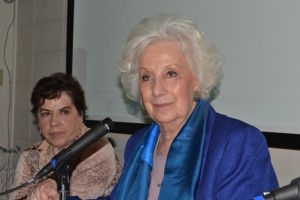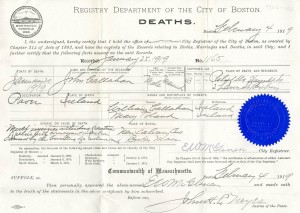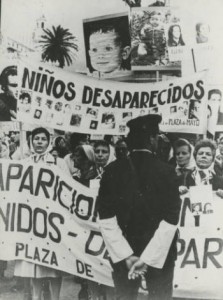
Estela Barnes de Carlotto, with Buscarita Roa (at left). Photo credit: Colleen Locke.
“We think it’s very important that our story not be forgotten,” said Estela Barnes de Carlotto, president and co-founder of Las Abuelas de Plaza de Mayo, through a translator.
On Thursday, September 19, 2013, 100 people (including many UMass Boston students, as well as members of the general public) attended a conversation with Estela Barnes de Carlotto and Buscarita Roa of Las Abuelas de Plaza de Mayo, one of Argentina’s most renowned human rights organizations. The event was co-sponsored by the Joseph P. Healey Library, the Latin American & Iberian Studies Department, the Women’s Studies Department, the Consortium for Gender, Security and Human Rights, and the Office of the Vice Chancellor for Academic Affairs at the University of Massachusetts Boston.
Barnes de Carlotto went on to describe the events that led to the formation of the Abuelas in 1977: “[W]e’ve had since 1930 in the Argentine republic a permanent succession of civic-military dictatorships. […] The last civilian-military dictatorship that came to power on March 24, 1976, was not just another in the succession of dictatorships. It was the worst and the most ferocious of them all. […] There were similar dictatorships in power in other countries, but the most ferocious of them all was in Argentina. Its goal was the physical elimination of anyone who opposed them. They made no distinctions between age or economic status or religion. Very young people from our secondary schools disappeared, because they were activists. University students like you disappeared. Their teachers, their professors disappeared. Religious base communities … trade unionists. Thirty thousand people that are no longer there and we don’t know where they are to this day. And a new word was coined. They are: disappeared. That is, to the present day, neither alive or dead.”
Las Abuelas de Plaza de Mayo (The Grandmothers of the Plaza de Mayo) is a human rights organization that works to find disappeared children who were abducted or born into captivity during the Argentine military dictatorship of 1976-1983. The goal of the Abuelas is to reunite these children with their biological families. The work of the Abuelas led to the establishment of the Banco Nacional de Datos Genéticos (National Genetic Data Bank) in Argentina in 1987, which permanently stores the genetic information of families who are looking for their missing relatives.

Over 100 people, including UMass Boston students and members of the general public, attended this conversation with the Abuelas in the Joseph P. Healey Library. Photo credit: Teresa Maceira.
“To date we have found 109 grandchildren,” noted Barnes de Carlotto. “That’s worthy of a toast and a celebration.”
This event also highlighted an exhibition organized by University Archives & Special Collections in the Healey Library. The exhibition, titled “Nunca Más”: Niños Desaparecidos en Argentina y Las Abuelas de Plaza de Mayo (“Never Again”: Disappeared Children in Argentina and the Grandmothers of the Plaza de Mayo), opened in April as part of an event celebrating of the life and work of biologist and human rights activist Rita Arditti, and particularly Arditti’s work with the Abuelas. The exhibition will be on display in the Library’s Grossmann Gallery through October. Read more about the exhibition and the Rita Arditti collection here.
During this most recent event, another member of the Abuelas, Buscarita Roa, discussed the future of the the organization. “Our struggle continues…” she said, “and that’s true even of the grandmothers who, like me, have found their grandchildren. We have to be in solidarity with our compañeros because this road is too long. We’re still missing almost 400 young people. We’re going to continue this struggle for many years and I hope we can find them all. It will be hard on us because some of us probably won’t live to see it. But we have other people to relieve us. The grandchildren we’ve gotten back are going to follow the same path, the path that we began. And they will go on looking for their brothers and sisters, as they call them.”

Buscarita Roa (at left) and Estela Barnes de Carlotto. Photo credit: Colleen Locke.
And when their grandchildren, those abducted or born into captivity, “come back to the lives they always should have had,” Roa went on to say, “they don’t feel alone anymore. They’re happy to get their families back. And those who don’t have any grandparents, because the grandparents have died, find that we, the Abuelas, are waiting for them with open arms.”
Click here to view a video of this event.
Click here to learn more about the ongoing efforts of Las Abuelas de Plaza de Mayo.
University Archives & Special Collections in the Joseph P. Healey Library at UMass Boston collects materials related to the university’s history, as well as materials that reflect the institution’s urban mission and strong support of community service, notably in collections of records of urban planning, social welfare, social action, alternative movements, community organizations, and local history related to neighboring communities.
University Archives & Special Collections welcomes inquiries from individuals, organizations, and businesses interested in donating materials of an archival nature that that fit within our collecting policy. These include manuscripts, documents, organizational archives, collections of photographs, unique publications, and audio and video media. For more information about donating to University Archives & Special Collections, click here or email library.archives@umb.edu.







